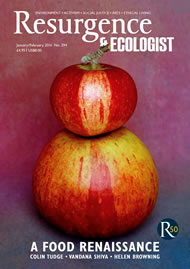Like many readers of Resurgence & Ecologist, I’m open to guidance about how I might best ‘do good’ in the world, so I was drawn to the title of Peter Singer’s latest book. Interest turned to disillusionment, however, as it became clear that Singer’s primary mode of ‘doing good’ involves giving money to charity. For those who want to push the bounds of altruism further, donating body parts to strangers (such as a kidney, given that most of us have a spare one) is also recommended.
The text serves as a handbook for ‘effective altruism’. It begins by charting the genesis of this movement (when the two charities Giving What We Can and 80,000 Hours united under the umbrella charity Centre for Effective Altruism) and moves on to provide its religious and philosophical underpinnings before tackling the practical concerns of how to be an effective altruist. The notion comes alive through the personal stories sprinkled throughout the text, from people who donate a significant proportion of modest incomes, to those who only contribute what they can cheerfully, to super altruists who have indeed bequeathed kidneys to strangers.
Effective altruists, Singer argues, want to know the extent to which their money is indeed doing good. He differentiates between charitable donors who give based on the ‘warm glow’ such generosity fosters and those who do their homework to assess the impact their contributions make. In addition to exercising choice about where to donate funds, effective altruists often make career and life choices that enable them to give maximum amounts of money. This can involve working in high-earning professions (such as investment banking or the stock market) rather than exercising their values by working in the lower-paid charitable or socially oriented sectors.
A key strand of Singer’s argument is that, given the extreme states of poverty in developing countries, effective altruists often direct their giving there. This choice raises the difficulties associated with measuring different types of suffering. Singer’s approach is decidedly utilitarian, with mathematical formulae applied in assessing, for instance, the relative value of curing blindness and of providing food for starving families. Such calculations leave me rather cold, but then I am a ‘warm glow’ donor (who, research suggests, is likely to give less when faced with such rational measures).
Although disappointed by the focus on monetary ways in which good can be done, I do find myself persuaded that bringing an evaluative edge to such giving can be beneficial. For instance, Singer cites research indicating that although deworming programmes may not be the most glamorous charitable outlet, they may well do the most good in terms of enabling children in developing nations to escape poverty.
Effective altruism has been critiqued on the grounds that it inadvertently supports the capitalist system, which is itself at the root of asymmetrical wealth distribution. Singer counters this argument by suggesting that we must work within the current system to change it, and that alleviating current suffering cannot wait until the system is overthrown. This seems a rather simplistic response to the complex and often confounding issue of global poverty. However, were I suffering from a disease that could be cured by available medicine, or watching my children die of starvation, I might more easily accept Singer’s stance.
Overall, the book may not offer the more holistic account of altruistic activity I’d hoped for (and the final chapter concerning preventing human extinction reads rather like a sci-fi novel), but it has encouraged me to overhaul my charitable donations. In Singer’s terms at least, that’s a step towards getting better at doing good.






